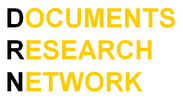Tess Legg PhD student, University of Bath I attended the GW4 Document Analysis training day in Cardiff. I was really pleased to be able to be part of the day as I certainly agreed with the premise that, although research is increasingly being conducted using documents as data, there isn’t a lot of clarity around potential analysis techniques, nor the epistemological assumptions behind different methods.
I’m a 1 + 3 PhD student studying Health and Wellbeing at the University of Bath. I’m working within the Tobacco Control Research Group, investigating corporate influence on science. As Aimee Grant outlined in her presentation, tobacco control research is a site of much documentary analysis work. This is because of legal action in the US in the ‘90s which meant that millions of internal tobacco documents were made publicly available. The documents research that this led to has brought insights into the ways in which the tobacco industry has attempted to influence science, affect public discourse, and ultimately, influence policymaking decisions. My research is now looking at corporate influence on science and the use of science in policymaking more broadly, across different sectors (such as alcohol, fast food, and industries contributing to pollution and climate change). Documents will play an important role in my PhD, so this GW4 workshop was very relevant to the work I’ll be doing. Throughout the day I particularly welcomed discussion on the need to have greater specificity between analysis techniques, as I had found through previous reading that this could be a sticky issue. Of course there is often overlap between methods, but working out how they are distinct helps to pinpoint what exactly you want to do with your data, and how. The idea of ‘slow scholarship’ in science, which George Jennings introduced, is something which feels very topical. With researchers increasingly encouraged to think in ‘real time’ (through Twitter, etc.) and keep up with the speed of policymaking, it was good to hear George remind us all that science is a ‘marathon not a sprint’. Finding more time for reflection on our own perspectives and research findings remains important. This may be easier said than done in a busy world, however! As an interdisciplinary student working in a field where both realist and constructionist forms of research exist alongside each other, it was interesting to hear about Jonathan Scourfield’s oscillation between paradigms throughout his career. It seems that academics often have less linear career paths than it may first appear, so it’s great that people are happy to talk about that and shed some light on how they came to be working both on their particular subject areas and through particular paradigmatic lenses. Emilie Whitaker led us through a critical analysis workshop where we began to analyse a political speech, dissecting it to find underlying ideologies and rhetoric. I found Emilie’s lecture really helpful to understand that in this type of research, analysis techniques are not necessarily tied to particular epistemologies. For example, critical analysis of documents could be led by Marxist or feminist thought where the focus is on issues of hegemony. The same documents could be interpreted in any number of other ways, including through a Foucauldian lens where the focus may be more concerned with knowledge as power and how status is given to science, for example. Days like this are great as you get to talk to other PhD students about their research, discuss your own, and learn from experienced academics. I’m sure there would be lots of interest in more documentary analysis training. I’m looking forward to hearing more about the Documents Research Network, and have been spreading the word. Thank you to Maria, Fryni, Aimee, George, Emilie, and Jonathan for a great day!
1 Comment
Leave a Reply. |
AuthorMembers of the Documents Research Network Archives
June 2019
Categories |

 RSS Feed
RSS Feed
